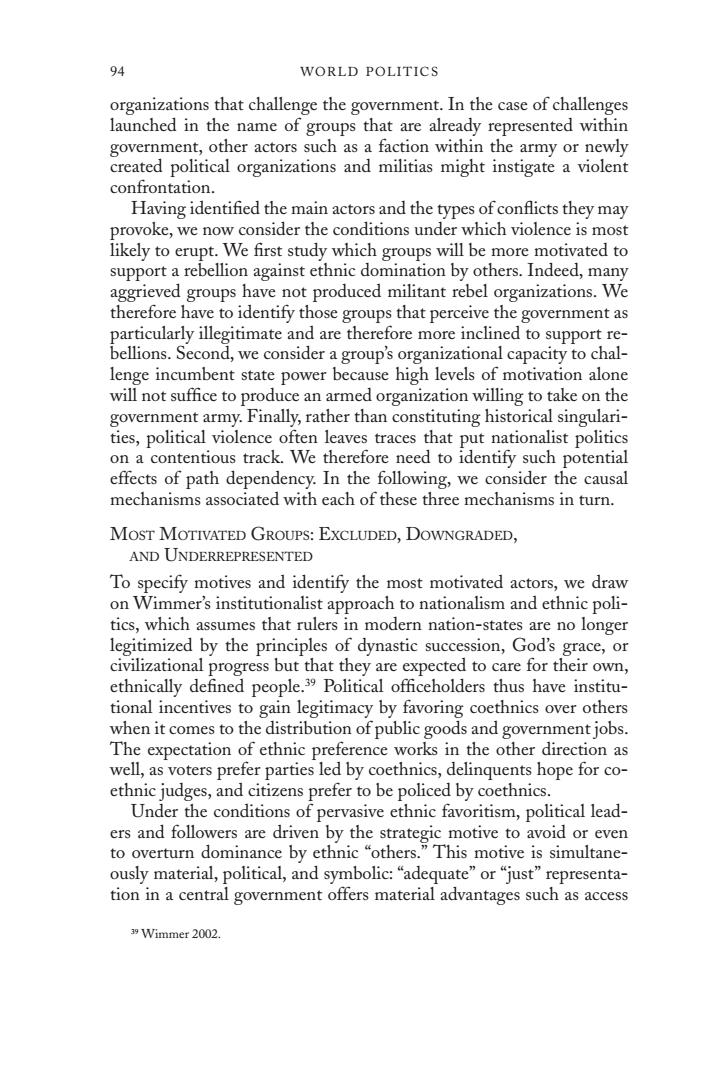正在加载图片...

94 WORLD POLITICS organizations that challenge the government.In the case of challenges launched in the name of groups that are already represented within government,other actors such as a faction within the army or newly created political organizations and militias might instigate a violent confrontation. Having identified the main actors and the types of conflicts they may provoke,we now consider the conditions under which violence is most likely to erupt.We first study which groups will be more motivated to support a rebellion against ethnic domination by others.Indeed,many aggrieved groups have not produced militant rebel organizations.We therefore have to identify those groups that perceive the government as particularly illegitimate and are therefore more inclined to support re- bellions.Second,we consider a group's organizational capacity to chal- lenge incumbent state power because high levels of motivation alone will not suffice to produce an armed organization willing to take on the government army.Finally,rather than constituting historical singulari- ties,political violence often leaves traces that put nationalist politics on a contentious track.We therefore need to identify such potential effects of path dependency.In the following,we consider the causal mechanisms associated with each of these three mechanisms in turn. MOST MOTIVATED GROUPS:EXCLUDED,DOWNGRADED, AND UNDERREPRESENTED To specify motives and identify the most motivated actors,we draw on Wimmer's institutionalist approach to nationalism and ethnic poli- tics,which assumes that rulers in modern nation-states are no longer legitimized by the principles of dynastic succession,God's grace,or civilizational progress but that they are expected to care for their own, ethnically defined people.39 Political officeholders thus have institu- tional incentives to gain legitimacy by favoring coethnics over others when it comes to the distribution of public goods and government jobs. The expectation of ethnic preference works in the other direction as well,as voters prefer parties led by coethnics,delinquents hope for co- ethnic judges,and citizens prefer to be policed by coethnics. Under the conditions of pervasive ethnic favoritism,political lead- ers and followers are driven by the strategic motive to avoid or even to overturn dominance by ethnic "others."This motive is simultane- ously material,political,and symbolic:“adequate'”or“just”representa- tion in a central government offers material advantages such as access 3 Wimmer 2002.94 world politics organizations that challenge the government. In the case of challenges launched in the name of groups that are already represented within government, other actors such as a faction within the army or newly created political organizations and militias might instigate a violent confrontation. Having identified the main actors and the types of conflicts they may provoke, we now consider the conditions under which violence is most likely to erupt. We first study which groups will be more motivated to support a rebellion against ethnic domination by others. Indeed, many aggrieved groups have not produced militant rebel organizations. We therefore have to identify those groups that perceive the government as particularly illegitimate and are therefore more inclined to support rebellions. Second, we consider a group’s organizational capacity to challenge incumbent state power because high levels of motivation alone will not suffice to produce an armed organization willing to take on the government army. Finally, rather than constituting historical singularities, political violence often leaves traces that put nationalist politics on a contentious track. We therefore need to identify such potential effects of path dependency. In the following, we consider the causal mechanisms associated with each of these three mechanisms in turn. Most Motivated Groups: Excluded, Downgraded, and Underrepresented To specify motives and identify the most motivated actors, we draw on Wimmer’s institutionalist approach to nationalism and ethnic politics, which assumes that rulers in modern nation-states are no longer legitimized by the principles of dynastic succession, God’s grace, or civilizational progress but that they are expected to care for their own, ethnically defined people.39 Political officeholders thus have institutional incentives to gain legitimacy by favoring coethnics over others when it comes to the distribution of public goods and government jobs. The expectation of ethnic preference works in the other direction as well, as voters prefer parties led by coethnics, delinquents hope for coethnic judges, and citizens prefer to be policed by coethnics. Under the conditions of pervasive ethnic favoritism, political leaders and followers are driven by the strategic motive to avoid or even to overturn dominance by ethnic “others.” This motive is simultaneously material, political, and symbolic: “adequate” or “just” representation in a central government offers material advantages such as access 39 Wimmer 2002